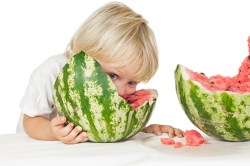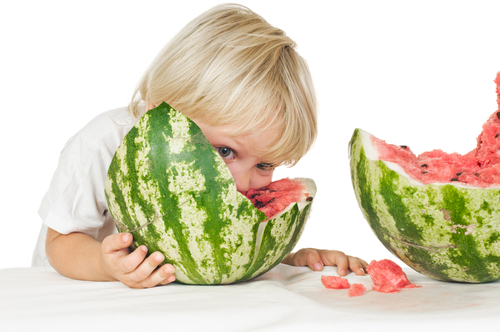
Photo by Shutterstock.
“They were piled up outside, on sale,” my dad said, “so I knew they were good.”
I make my living advocating the use of fresh, local produce, and I’m the one who cooks when my family gathers at our cabin in Northern Minnesota. So there were several things about my dad hauling a dozen giant melons — honeydew, cantaloupe, and watermelons — into the already chock-full galley kitchen out of which I was planning on feeding seven people, plus dinner guests, for the weekend that irked me.
First and most obvious: It was early July. Where we were, above the 45th parallel, melons were simply not in season.
Second, the melons did not, in fact, fit in the kitchen. At all. The cupboards were full, the fridge was jam-packed, and the counters in the kitchen — or, rather, those areas of the counter that the dog couldn’t reach, because my parents’ dog has a singular talent for nabbing food off any surface she can access — were themselves already piled high. The kitchen is small and my mom is known for what can most nicely be called buying amply when we gather. Coffee cakes and rolls and eggs and bacon and yogurt for breakfast, loaves of bread and sliced meats for sandwiches, avocados and salsa and chips and limes and lemons for margaritas and guacamole, various nuts and crackers and cheeses and fruit in case of peckishness, and then, of course, all the food for dinners, each episode of which would most certainly result in leftovers a-plenty.
The melons were, therefore, relegated to a sideboard in the living room.
Third, excuse me, but who on earth buys a dozen melons for seven people for two days? When one considers that my brother won’t touch them, it’s really six people, which means a melon apiece. Each day. By any scenario that’s a lot of melon. In a situation in which other foodstuffs exist — and exist they did, as explained above — it’s patently ridiculous. But I guess we already know who does this: my dad. So perhaps the question we should be asking is why did he do this?
The answer is simple: a good deal to tempt his eye (I believe they were 60 cents a pound) and a complete lack of experience buying groceries. My parents have a fairly traditional division of labor, which means that when my dad does go to a grocery store, it’s usually to get things only he needs. It’s almost always, in fact, to buy his own dinner for that night because my mom is out of town. When he does this he buys food that, by his own description, he doesn’t “have to touch.” That he bought fresh produce at all was, in a way, somewhat miraculous.
He also bought these dozen melons without a plan in the world on what to do with them. And that leads to reason No. 4 that I was peeved: I had just been given a fair amount of work. I could have disregarded the melons, washing my hands of them, but between my intense distaste for food waste (around 40 percent of the food produced in this country doesn’t get eaten) and overdeveloped work ethic, that was hardly likely.
In short, while I wasn’t thrilled that the melons were in the house, I was damn determined to see them get eaten.
I tried to tackle the problem logically. I broke down the biggest watermelon — a real humdinger more suitable for a company picnic than a family weekend — and whirled it in the blender with just a bit of sugar (I have to admit, it was a supremely sweet specimen). I poured the puree into a baking pan, and set it in the freezer to get some granita on.
A cantaloupe was cut into wedges, draped with prosciutto, and added as a first course (“fancy!” proclaimed my brother as he ate the prosciutto off his melon, leaving the orange half-moon untouched) at dinner that night.
Next up: the honeydew. Fruit salad at breakfast. Cubed, drizzled with a light syrup made by diluting some honey with a squirt of lime juice, and topped with fresh mint leaves torn into pieces.
It was hot out, so I turned three melons into aqua fresca and passed tumblers of the pureed and strained melon with or without vodka or tequila — hey, I was willing to play dirty if need be — around to people at lunch and wherever I could find them lounging on decks or sitting on docks throughout the afternoon.
The next night, I made a watermelon and feta salad drizzled with olive oil and sprinkled with plenty of freshly ground black pepper. From where I sat at dinner I could see the remaining melons in the living room. Thanks to my melon-loving husband’s valiant efforts (half a melon at breakfast each morning!), we were down to five. Everyone was headed home before dinner the next day. I could feel the still-copious amount of granita sitting in the freezer and I wondered how much more aqua fresca I could trick people into drinking before they packed up and escaped the melon madness.
My mind reeled from the responsibility. And then my dad, who had been a bit skeptical about the salad at first, piped up: “This is really good. You know, I should buy melons more often.”



